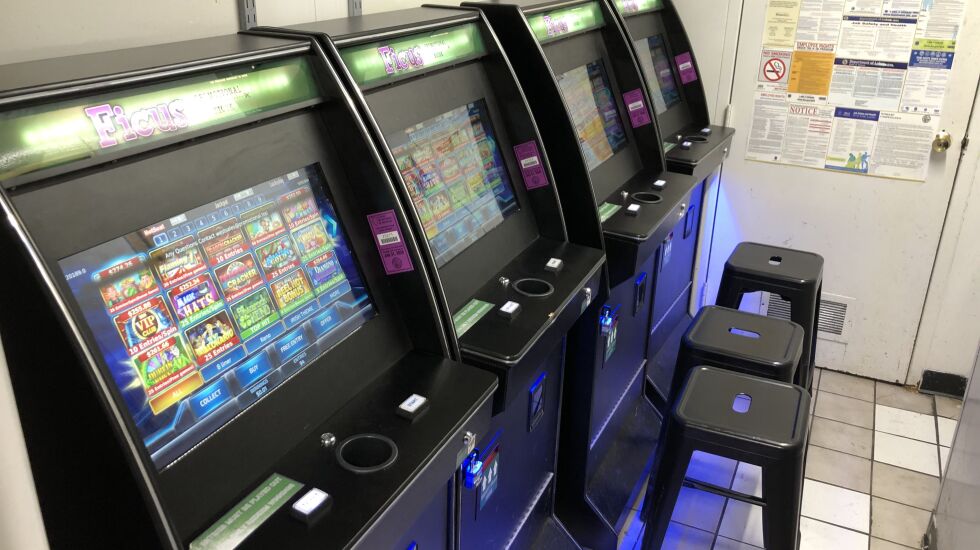
They look and operate like typical video gambling machines. But they’re unregulated and largely untaxed, thanks to loopholes in Illinois’ gaming laws.
And now, so-called “sweepstakes” machines are at the center of the latest public corruption trial at the Dirksen Federal Courthouse.
Businessman James T. Weiss is accused of paying $32,500 in bribes to then-state Rep. Luis Arroyo between November 2018 and October 2019 to promote and vote for legislation related to sweepstakes machines in the Illinois General Assembly.
When the legislation didn’t pass, the men turned to then-state Sen. Terry Link and allegedly offered him a bribe to support their bill. But Link happened to be cooperating with the FBI.
Federal prosecutors charged Arroyo with bribery in October 2019, and a grand jury indicted Arroyo and Weiss one year later, in October 2020. Arroyo pleaded guilty and is already serving a 57-month prison sentence. Weiss’ trial began June 5.
Meanwhile, sweepstakes machines continue to be a lingering issue in Illinois.
State Rep. Daniel Didech, D-Buffalo Grove and chair of Illinois’ House gaming committee, told the Chicago Sun-Times that “to an untrained eye” sweepstakes machines look like slot machines.
But because they also offer “free plays” and allow players to win coupons or prizes rather than money, “they don’t fit into the definition of video gaming that we have in state law right now.”
That means that while state and local governments collected more than $900 million in tax revenue from traditional video gaming machines in 2022, no such revenue was collected from sweepstakes machines.
“No judge has ever said they’re illegal, so that’s the problem,” explained Ivan Fernandez, president and executive director of the Illinois Gaming Machine Operators Association.
Weiss’ defense attorneys have made the point that the state can collect revenue from sweepstakes devices through an amusement tax sticker and an associated annual fee, as well as through income tax.
But Didech said officials also don’t know if sweepstakes machines “are fair to players, if it’s possible for players to win on these machines.”
State Sen. Bill Cunningham, D-Chicago, said the Illinois Senate has, on three occasions, passed legislation meant to clarify the law. Cunningham said he sponsored such legislation on behalf of the Illinois Gaming Board, but also as “an ethical matter.”
“Given that a public corruption scandal erupted in the General Assembly on the very topic of sweepstakes games, we in the Senate believe that a signal needed to be sent that there is no gray area on this topic,” Cunningham said.
One such piece of legislation passed the Senate in March. Didech is now its chief sponsor in the House. But Didech told the Sun-Times he doesn’t expect the bill to pass that chamber in its current form.
Didech explained that the proliferation of sweepstakes machines was the result of the decisions by some local governments — Chicago, most notably — not to allow video gambling. Sweepstakes machines then showed up in municipalities where the traditional machines couldn’t go.
Didech said that made sweepstakes machines an “unintended consequence” of Illinois’ video gaming law. He also said he’d rather take a more thoughtful approach the next time around, rather than pass a law that could lead to “more black-market gambling” or other issues.
Chicago Mayor Brandon Johnson’s campaign staff made supportive comments about video gambling before his election this year, calling it “an important revenue source for critical investments in public safety, transportation, housing and other public accommodations.”
So Didech said he’d prefer sweepstakes machines become part of a “larger conversation about whether Chicago is going to opt in to our video gaming regime.”
Meanwhile, Fernandez told the Sun-Times that traditional video gaming devices are “much more attractive” than sweepstakes machines. The technology, he said, rivals that found in a traditional casino.
And, he said, “if there were a market where video gaming were allowed, [sweepstakes] would not survive.”
Editor’s Note: This story has been updated to reflect testimony on June 7, 2023 in the trial of James T. Weiss.







